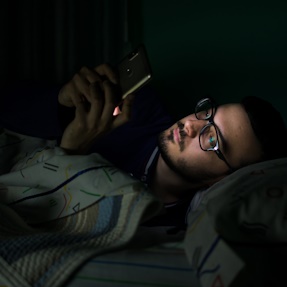
For the sake of your health, don’t let technology ruin a good night’s sleep
What would we do without cell phones, tablets, computers and other electronic gadgets? We likely get a better night’s sleep. Unfortunately, they have become such ubiquitous in our lives that it’s hard to put them down – even at bedtime. Yet that’s the one time we need to learn to put them away allowing ourselves hours to relax, rest, and reenergize our bodies.
Very few of us would deny the importance of a good night’s sleep. Waking up refreshed and reinvigorated is the perfect beginning to facing a new day. Yet, many of us are not waking up energized ready to tackle the day ahead. Many of us are instead, hitting the snooze button more than once as we struggle to will ourselves to wake up. Why? The reason is that up to 95 percent of us use electronic devices before sleeping, according to the National Sleep Foundation.
Whether you’re checking social media on your cellphone, laptop, or iPad, texting, or watching Netflix, using electronic devices so close to bedtime can lead to sleep disturbances, resulting in low energy and drowsy driving the following day.
Technologies influence on our sleep
Just like a healthy diet, exercise and daily sunshine are necessary for good health, so is a good night’s sleep. For our brain and body to function correctly, healthy, quality sleep is a must. Still, unfortunately, technology has taken over our night hours keeping us awake when we should be fast asleep.
There are many ways in which technology is eroding our sleep quality and quantity. Here are some of the ways in which it does:
- Using technology in the evening makes it harder to drift off to sleep.
- Our electronic devices have stimulating effects on our brain impacting sleep.
- Exposure to light from screens can send signals to the brain that disrupt melatonin production, essential for healthy sleep. All wavelengths of light cause this effect, but blue light is especially troublesome. Electronic devices and lighting used by night workers emit blue light, making us feel more alert and interfering with our natural sleep cycle.
- Repeatedly using technology with a bright screen in the evening can eventually make you want to go to bed later and to sleep in longer the next day.
- Passive activities like reading e-books or watching movies are less disruptive than interactive ones such as video games, making posts or messaging.
- The use of electronic devices in the evening can interfere with sleep.
- They can delay your bedtime, which delays the onset of REM sleep compromising alertness the following day.
As time passes, the adverse effects of lack of sleep can accumulate and result in a serious and chronic sleep deficiency. Continuous sleep disturbances can lead to weight gain, anxiety, depression, and reduced immunity. Additionally, some studies have shown a correlation between sleep deprivation and high blood pressure and heart disease.
Reducing screens impact on sleep
The first step in assessing your electronic devices impact on your sleep, is to ask yourself an honest question – how much time am I spending using technology, especially within three hours before bedtime? If you honestly answer “too much,” and you haven’t slept well for a while, it’s time to take a hard look at how much time technology is using up your sleep time.
Even though technology can entertain and engage us, we also need to limit the frequency and duration of time spent on them. Here are some suggestions on reducing technologies influence on our sleep:
- Refrain from using electronic devices for at least 60 minutes before going to bed. This will help you sleep better and improve the quality of your rest.
- Put all electronic devices – including your cell phone – in another room instead of your bedroom. This will discourage you from checking them during the night.
- An hour before bedtime, slowly dimming the room lights to release melatonin.
- During the hour before bedtime, choose a relaxing, anxiety-inhibiting activity such as watching a favorite TV show, reading a paper book or using a Kindle that doesn’t emit blue light, listening to music, or doing some stretches.
Dr. David Samadi is the Director of Men’s Health and Urologic Oncology at St. Francis Hospital in Long Island. He’s a renowned and highly successful board certified Urologic Oncologist Expert and Robotic Surgeon in New York City, regarded as one of the leading prostate surgeons in the U.S., with a vast expertise in prostate cancer treatment and Robotic-Assisted Laparoscopic Prostatectomy. Dr. Samadi is a medical contributor to NewsMax TV and is also the author of The Ultimate MANual, Dr. Samadi’s Guide to Men’s Health and Wellness, available online both on Amazon and Barnes & Noble. Visit Dr. Samadi’s websites at robotic oncolo gy and prostate cancer 911.
